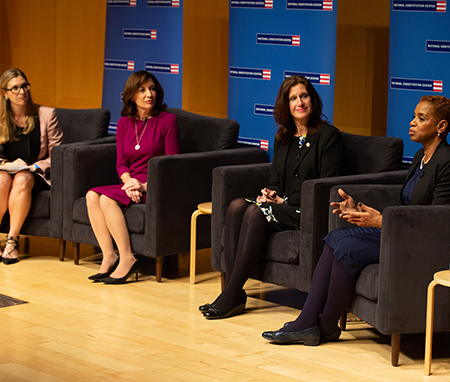Historians Harold Holzer, author of several books on President Abraham Lincoln, including Lincoln: How Abraham Lincoln Ended Slavery in America; and Manisha Sinha, author of The Slave's Cause: A History of Abolition; join Edward Larson for a conversation on Larson’s new book, American Inheritance: Liberty and Slavery in the Birth of a Nation, 1765-1795, to explore the paradox of liberty and slavery in Revolutionary America through the Civil War era. Jeffrey Rosen, president and CEO of the National Constitution Center, moderates.
This program is made possible through the generous support of Citizens and presented in partnership with the Civil War Museum of Philadelphia.
Video
Podcast
Participants
Harold Holzer is the Jonathan F. Fanton Director of The Roosevelt House Public Policy Institute at Hunter College. He is one of the country's leading authorities on Abraham Lincoln and the political culture of the Civil War era, and served six years as chairman of the Abraham Lincoln Bicentennial Foundation, and the previous 10 years as co-chair of the U.S. Lincoln Bicentennial Commission. He is the author, coauthor, or editor of 55 books and his latest book is The Presidents vs. the Press: The Endless Battle Between The White House and the Media—From the Founding Fathers to Fake News.
Edward Larson is University Professor of History and Hugh and Hazel Darling Chair in Law at Pepperdine University. A recipient of the Pulitzer Prize in History and numerous other awards for writing and teaching, he is the author or co-author of 18 books and over 100 published articles. His most recent book is American Inheritance: Liberty and Slavery in the Birth of a Nation, 1765-1795.
Manisha Sinha is the James L. and Shirley A. Draper Chair in American History at the University of Connecticut. A leading authority on the history of slavery and abolition and the Civil War and Reconstruction, she is the author of The Counterrevolution of Slavery: Politics and Ideology in Antebellum South Carolina and the award-winning book, The Slave’s Cause: A History of Abolition. She has a forthcoming book entitled The Rise and Fall of the Second American Republic: A Long History of Reconstruction, 1860-1900.
Jeffrey Rosen is the president and CEO of the National Constitution Center, a nonpartisan nonprofit organization devoted to educating the public about the U.S. Constitution. Rosen is also professor of law at The George Washington University Law School and a contributing editor of The Atlantic.
Additional Resources
- Harold Holzer, Lincoln: How Abraham Lincoln Ended Slavery in America
- Edward Larson, American Inheritance: Liberty and Slavery in the Birth of a Nation, 1765-1795
- Manisha Sinha, The Slave's Cause: A History of Abolition
- Edward Larson, Franklin & Washington: The Founding Partnership
- Ed. Edward Larson and Michael Winship, The Constitutional Convention: A Narrative from the Notes of James Madison
- Manisha Sinha, The Counterrevolution of Slavery: Politics and Ideology in Antebellum South Carolina
- David Walker's Appeal (1829)
- Somerset v. Stewart (1772)
- The Northwest Ordinance of 1787
- Republican Party Platform of 1856
- Harold Holzer, Lincoln President-Elect: Abraham Lincoln and the Great Secession Winter 1860-1861
- Abraham Lincoln, "House Divided" Speech (1858)
- Abraham Lincoln, First Inaugural Address (1861)
- Abraham Lincoln, Fragment on the Constitution and Union (1861)
- Mass.gov, "Massachusetts Constitution and the Abolition of Slavery"
- National Constitution Center, Founders’ Library, “Petition from the Pennsylvania Society for the Abolition of Slavery to the First Congress (1790)”
- Dred Scott v. Sanford (1857)
- The District of Columbia Emancipation Act (1862)
- Ed. Harold Holzer and Sara Vaughn Gabbard, Lincoln and Freedom: Slavery, Emancipation, and the Thirteenth Amendment
- Abraham Lincoln, Last Public Address (1865)
- National Constituion Center & Google Arts and Culture, "The 13th Amendment" Online Exhibit
Transcript
View Transcript
This transcript may not be in its final form, accuracy may vary, and it may be updated or revised in the future.
Stay Connected and Learn More
Continue the conversation on Facebook and Twitter using @ConstitutionCtr.
Sign up to receive Constitution Weekly, our email roundup of constitutional news and debate, at bit.ly/constitutionweekly.
Please subscribe to Live at the National Constitution Center and our companion podcast We the People on Apple Podcasts, Stitcher, or your favorite podcast app.








